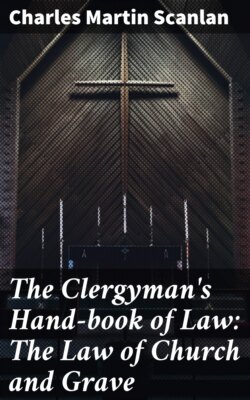Читать книгу The Clergyman's Hand-book of Law: The Law of Church and Grave - Charles Martin Scanlan - Страница 8
На сайте Литреса книга снята с продажи.
Chapter IV. Statutory Law
ОглавлениеTable of Contents
50. Wisconsin, Mississippi, New York.—The statutory law of the different States of the Union is so varied and the laws of one State are of so little interest to the people of another that it would be almost useless and beyond the boundaries of this work to give the substance of the various statutes. In some States there is a limitation upon the real estate that a church or charitable organization may hold, and in other States there is no limitation whatever. Wisconsin, perhaps, occupies the extreme of greatest liberality, by not only allowing full freedom in everything relating to religion and charity, but it further excepts from the limitation all rights of alienation of real estate granted or devised to a charitable association or to literary or charitable corporations organized under the law of the State. The State of Mississippi probably stands at the other extreme both in the narrowness of its constitution and statutory law, and prohibits any [pg 042] devise or bequest of any personal property or real estate in favor of any religious or ecclesiastical corporation or any religious or ecclesiastical society. Neither does it exempt a clergyman, physician, or lawyer, from examination as a witness concerning information that he obtained in the performance of his functions or duties as such. Its judges, however, are more liberal than its legislators, and I know of no instance in which a clergyman, physician, or lawyer, as a witness, was sent to jail for contempt of court for not divulging information obtained in his professional capacity. Probably New York has the most complete code86 relating to religious corporations.
51. Real Estate, Parish, Diocese, Taxation.—It is very important that a congregation about to purchase real estate should examine and understand the statutory law of the State governing the powers and authority of the Church as a civil organization. In some States there is no special law for incorporating religious societies; while in most States there are special provisions therefor. For this reason, I emphasize the fact that no parish or clergyman is justified in organizing a congregation or purchasing land without first knowing the law of that particular [pg 043] State. But generally it is best that each congregation be incorporated and that its property be held in the name of the corporation, so that the debts of one corporation will not embarrass the diocese, and that bequests and gifts made to a church may be enforced in the courts. The proceedings to incorporate are fully stated in the statutes of each State. One of the things of the utmost importance is that any notice to be given must be given strictly as required by law.87 Another is to incorporate in the way that avoids taxation.88
52. Riot, Damages.—Under a statute providing that a person whose property is destroyed by riot may bring suit against the county for damages, a corporation for religious purposes, as well as an individual, has a right of action.89
53. Use, Change, Parsonage, Discipline, Doctrine, Curate.—When a fee simple is acquired by a religious corporation, without restriction as to quantity, but limiting the purpose of its use, a subsequent Legislature, with the consent of the corporation, has power to change or abrogate altogether the restrictions as to the use of the land.90 And [pg 044] the Legislature may empower the church corporation to convey a house devised to it for a parsonage with a condition that it be kept in repair, and invest the proceeds in other property to be held for the same purpose.91 A State legislature can not interfere in church discipline and doctrine, as by legislating what shall constitute a curate in the Catholic Church.92
[pg 045]
